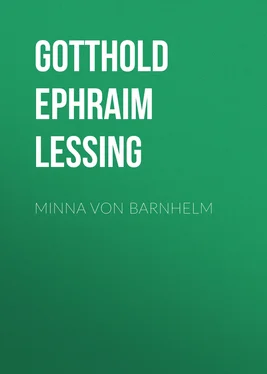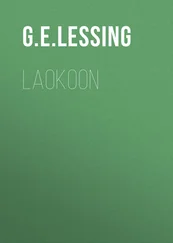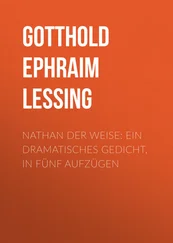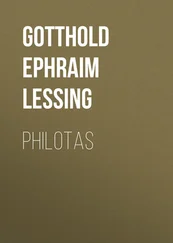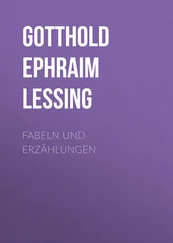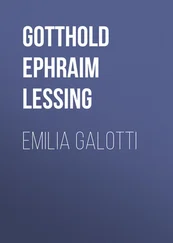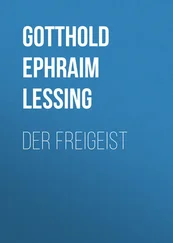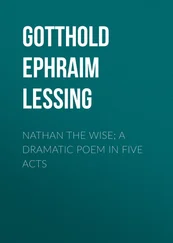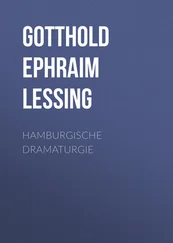Gotthold Lessing - Minna Von Barnhelm
Здесь есть возможность читать онлайн «Gotthold Lessing - Minna Von Barnhelm» — ознакомительный отрывок электронной книги совершенно бесплатно, а после прочтения отрывка купить полную версию. В некоторых случаях можно слушать аудио, скачать через торрент в формате fb2 и присутствует краткое содержание. Жанр: foreign_dramaturgy, Драматургия, foreign_antique, foreign_prose, на английском языке. Описание произведения, (предисловие) а так же отзывы посетителей доступны на портале библиотеки ЛибКат.
- Название:Minna Von Barnhelm
- Автор:
- Жанр:
- Год:неизвестен
- ISBN:нет данных
- Рейтинг книги:3 / 5. Голосов: 1
-
Избранное:Добавить в избранное
- Отзывы:
-
Ваша оценка:
- 60
- 1
- 2
- 3
- 4
- 5
Minna Von Barnhelm: краткое содержание, описание и аннотация
Предлагаем к чтению аннотацию, описание, краткое содержание или предисловие (зависит от того, что написал сам автор книги «Minna Von Barnhelm»). Если вы не нашли необходимую информацию о книге — напишите в комментариях, мы постараемся отыскать её.
Minna Von Barnhelm — читать онлайн ознакомительный отрывок
Ниже представлен текст книги, разбитый по страницам. Система сохранения места последней прочитанной страницы, позволяет с удобством читать онлайн бесплатно книгу «Minna Von Barnhelm», без необходимости каждый раз заново искать на чём Вы остановились. Поставьте закладку, и сможете в любой момент перейти на страницу, на которой закончили чтение.
Интервал:
Закладка:
Gotthold Ephraim Lessing
Minna Von Barnhelm
INTRODUCTORY NOTE
Gotthold Ephraim Lessing was born at Kamenz, Germany, January 22, 1729, the son of a Lutheran minister. He was educated at Meissen and Leipzic, and began writing for the stage before he was twenty. In 1748 he went to Berlin, where he met Voltaire and for a time was powerfully influenced by him. The most important product of this period was his tragedy of "Miss Sara Samson," a modern version of the story of Medea, which began the vogue of the sentimental middle-class play in Germany. After a second sojourn in Leipzic (1755-1758), during which he wrote criticism, lyrics, and fables, Lessing returned to Berlin and began to publish his "Literary Letters," making himself by the vigor and candor of his criticism a real force in contemporary literature. From Berlin he went to Breslau, where he made the first sketches of two of his greatest works, "Laocoon" and "Minna von Barnhelm," both of which were issued after his return to the Prussian capital. Failing in his effort to be appointed Director of the Royal Library by Frederick the Great, Lessing went to Hamburg in 1767 as critic of a new national theatre, and in connection with this enterprise he issued twice a week the "Hamburgische Dramaturgie," the two volumes of which are a rich mine of dramatic criticism and theory.
His next residence was at Wolfenbuttel, where he had charge of the ducal library from 1770 till his death in 1781. Here he wrote his tragedy of "Emilia Galotti," founded on the story of Virginia, and engaged for a time in violent religious controversies, one important outcome of which was his "Education of the Human Race." On being ordered by the Brunswick authorities to give up controversial writing, he found expression for his views in his play "Nathan the Wise," his last great production.
The importance of Lessing's masterpiece in comedy, "Minna von Barnhelm," is difficult to exaggerate. It was the beginning of German national drama; and by the patriotic interest of its historical background, by its sympathetic treatment of the German soldier and the German woman, and by its happy blending of the amusing and the pathetic, it won a place in the national heart from which no succeeding comedy has been able to dislodge it.
DRAMATIS PERSONAE
MAJOR VON TELLHEIM, a discharged officer.
MINNA VON BARNHELM.
COUNT VON BRUCHSAL, her uncle.
FRANZISKA, her lady's maid.
JUST, servant to the Major.
PAUL WERNER, an old Sergeant of the Major's.
The LANDLORD of an Inn.
A LADY.
An ORDERLY.
RICCAUT DE LA MARLINIERE.
The scene alternates between the Parlour of an Inn, and a Room adjoining it.
ACT I
SCENE I
Just
JUST (sitting in a corner, and talking while asleep).
Rogue of a landlord! You treat us so? On, comrade! hit hard!
(He strikes with his fist, and wakes through the exertion).
Ha! there he is again! I cannot shut an eye without fighting with him.
I wish he got but half the blows. Why, it is morning! I must just look for my poor master at once; if I can help it, he shall not set foot in the cursed house again. I wonder where he has passed the night?
SCENE II
Landlord, Just
LAND.
Good-morning, Herr Just; good-morning! What, up so early! Or shall I say—up so late?
JUST.
Say which you please.
LAND.
I say only—good-morning! and that deserves, I suppose, that Herr Just should answer, "Many thanks."
JUST.
Many thanks.
LAND.
One is peevish, if one can't have one's proper rest. What will you bet the Major has not returned home, and you have been keeping watch for him?
JUST.
How the man can guess everything!
LAND.
I surmise, I surmise.
JUST. (turns round to go).
Your servant!
LAND. (stops him).
Not so, Herr Just!
JUST.
Very well, then, not your servant!
LAND.
What, Herr Just, I do hope you are not still angry about yesterday's affair! Who would keep his anger over night?
JUST.
I; and over a good many nights.
LAND.
Is that like a Christian?
JUST.
As much so as to turn an honourable man who cannot pay to a day, out of doors, into the street.
LAND.
Fie! who would be so wicked?
JUST.
A Christian innkeeper.—My master! such a man! such an officer!
LAND.
I thrust him from the house into the streets? I have far too much respect for an officer to do that, and far too much pity for a discharged one! I was obliged to have another room prepared for him.
Think no more about it, Herr Just.
(Calls)
–Hullo! I will make it good in another way.
(A lad comes.)
Bring a glass; Herr Just will have a drop; something good.
JUST.
Do not trouble yourself, Mr. Landlord. May the drop turn to poison, which… But I will not swear; I have not yet breakfasted.
LAND. (to the lad, who brings a bottle of spirits and a glass).
Give it here; go! Now, Herr Just; something quite excellent; strong, delicious, and wholesome.
(Fills, and holds it out to him.)
That can set an over-taxed stomach to rights again!
JUST.
I hardly ought!—And yet why should I let my health suffer on account of his incivility?
(Takes it, and drinks.)
LAND.
May it do you good, Herr Just!
JUST. (giving the glass back).
Not bad! But, Landlord, you are nevertheless an ill-mannered brute!
LAND.
Not so, not so!… Come, another glass; one cannot stand upon one leg.
JUST. (after drinking).
I must say so much—it is good, very good! Made at home, Landlord?
LAND.
At home, indeed! True Dantzig, real double distilled!
JUST.
Look ye, Landlord; if I could play the hypocrite, I would do so for such stuff as that; but I cannot, so it must out.—You are an illmannered brute all the same.
LAND.
Nobody in my life ever told me that before… But another glass, Herr Just; three is the lucky number!
JUST.
With all my heart!—
(Drinks).
Good stuff indeed, capital! But truth is good also, and indeed, Landlord, you are an ill-mannered brute all the same!
LAND.
If I was, do you think I should let you say so?
JUST.
Oh! yes; a brute seldom has spirit.
LAND.
One more, Herr Just: a four-stranded rope is the strongest.
JUST.
No, enough is as good as a feast! And what good will it do you, Landlord? I shall stick to my text till the last drop in the bottle.
Shame, Landlord, to have such good Dantzig, and such bad manners! To turn out of his room, in his absence—a man like my master, who has lodged at your house above a year; from whom you have had already so many shining thalers; who never owed a heller in his life—because he let payment run for a couple of months, and because he does not spend quite so much as he used.
LAND.
But suppose I really wanted the room and saw beforehand that the Major would willingly have given it up if we could only have waited some time for his return! Should I let strange gentlefolk like them drive away again from my door! Should I wilfully send such a prize into the clutches of another innkeeper? Besides, I don't believe they could have got a lodging elsewhere. The inns are all now quite full. Could such a young, beautiful, amiable lady remain in the street? Your master is much too gallant for that. And what does he lose by the change? Have not I given him another room?
JUST.
By the pigeon-house at the back, with a view between a neighbour's chimneys.
LAND.
The view was uncommonly fine, before the confounded neighbour obstructed it. The room is otherwise very nice, and is papered!!!!!
Читать дальшеИнтервал:
Закладка:
Похожие книги на «Minna Von Barnhelm»
Представляем Вашему вниманию похожие книги на «Minna Von Barnhelm» списком для выбора. Мы отобрали схожую по названию и смыслу литературу в надежде предоставить читателям больше вариантов отыскать новые, интересные, ещё непрочитанные произведения.
Обсуждение, отзывы о книге «Minna Von Barnhelm» и просто собственные мнения читателей. Оставьте ваши комментарии, напишите, что Вы думаете о произведении, его смысле или главных героях. Укажите что конкретно понравилось, а что нет, и почему Вы так считаете.
